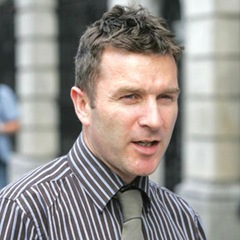Harry McGee
 Unveiling the current scandals and analysing the statements and motives of politicians in Leinster House is all part of a days work for Harry McGee, who is on the political staff of The Irish Times. Usually found rushing around the corridors of the Oireachtas, Harry’s other interests include climate change and the environment. Here, he tells eolas about the current political situation and how he sees the public reacting to the economic crisis.
Unveiling the current scandals and analysing the statements and motives of politicians in Leinster House is all part of a days work for Harry McGee, who is on the political staff of The Irish Times. Usually found rushing around the corridors of the Oireachtas, Harry’s other interests include climate change and the environment. Here, he tells eolas about the current political situation and how he sees the public reacting to the economic crisis.
How did you get started in journalism and what educational and career pathway led you to your current position with The Irish Times?
I started getting interested in current affairs around the time of my intermediate (junior) certificate and became an avid reader of Magill magazine, a pioneering current affairs magazine, and British music magazines like NME and Melody Maker. I was involved in student magazines in university and after spending a year festering in London after my BA I did a post-graduate course in journalism in NUI Galway. I never looked back from there.
Where does your interest in politics come from?
From around the time I was doing the post-graduate course in Galway. Initially I was interested in current affairs and issues, rather than party politics. Anybody working in news and current affairs journalism will acquire an interest in politics. It informs almost everything we do.
Describe the atmosphere in Leinster House over the last few months.
It has been fractious. But the Government has survived the pitfalls so far. The change in the country’s fortunes is unprecedented. Nobody in politics has experienced anything like this before. You have a sense of momentous change and of a challenge ahead that is almost beyond comprehension.
In your view, what are the most important issues affecting politics in Ireland at the moment and what issues do you forecast to be most prominent in the coming year?
The economy primarily is the issue that will continue to affect Ireland for some time. The huge downturn in state finances and the serious crisis affecting the banks has affected every other area of Irish life.
Do you feel that the Irish people are politically aware and what is the general mood towards the Government?
Yes, but only to an extent. A party that would have suggested even the tiniest austerity measure before 2007 would have got an electoral fleecing. People did not have realistic expectations then. You find that even now some remain not having realistic expectations.
What do you enjoy most about journalism?
The huge variety that goes with the work. No two days are the same. It’s good to break stories. It’s also good to be able to write a piece that people will enjoy or appreciate.
What is the main challenge in your job?
Accuracy and time pressure. You must make sure you cover all the bases and get the story right and authoritative.
How do you decide what makes a good news story?
It will be of interest and/or interesting to people.
What has been the highlight of your career so far?
I wrote a series on mental hospitals for Magill and I’m very proud of that. There has been no Watergate but a decent number of stand-outs.
If you had chosen another career, what would it be?
My mother was a medical practitioner. I would have been a good GP, I think.
How do you like to relax outside work?
I enjoy running, mountaineering, cycling, going to films and plays, and following the GAA.





